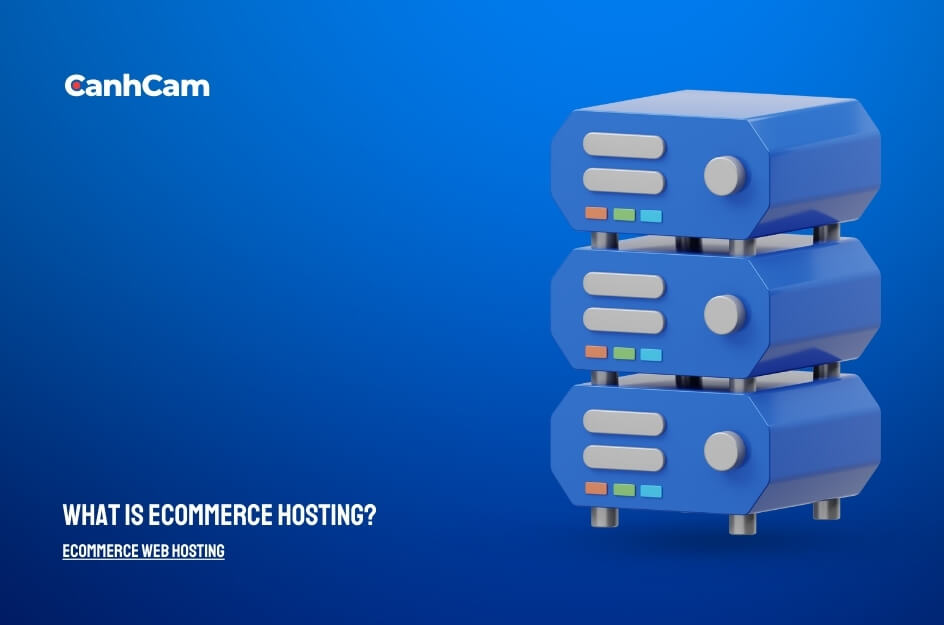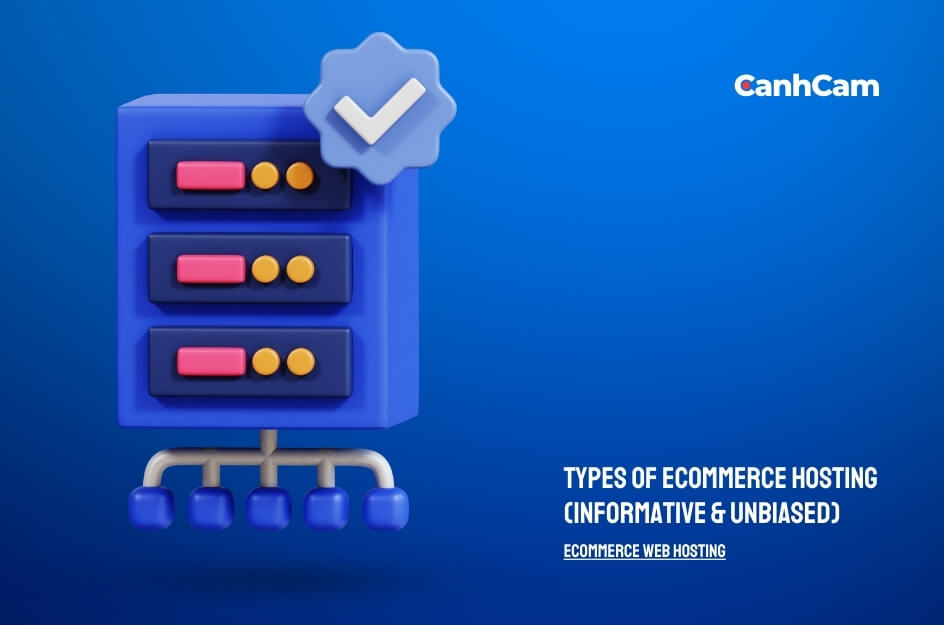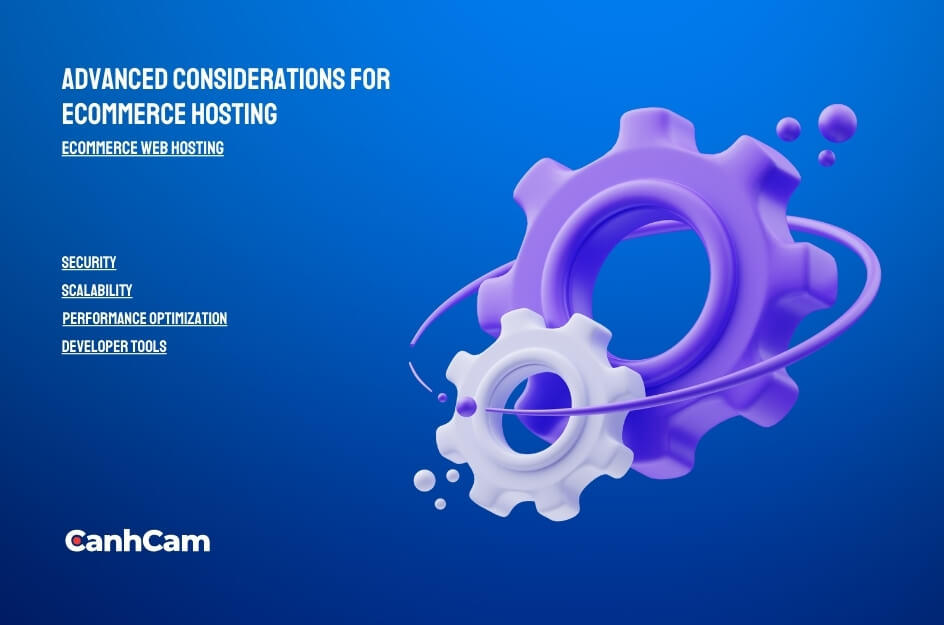If you have an online store, choosing a good e-commerce host is more important than you think. Too many businesses fail due to poor loading speeds, poor security, and poorly managed web servers.
But what makes a good eCommerce host? Which Ecommerce hosting to choose? We've put together a list of the top qualities you should always look for in a web host to support your search and make a more informed decision. Also, we will take each term to explain it to you clearly and simply, from the notion of host to server, from cloud to domain name.
However, you will not have to choose a host only if you have chosen an open-source CMS. The choice of your host will have repercussions on the management and administration of your E-Commerce site.
Ready to get started? Let’s dive in!
What is Ecommerce Hosting?
At its core, websites or ecommerce stores that want to go online need one key element: hosting, ecommerce hosting provides a server on which your site resides, giving it the ability to connect to the internet and let people visit it.
You must think in this way: Basically, you're buying the right to someone else's unused server space and getting service from a company that knows how to secure and optimize its servers.

Ecommerce web hosting goes beyond storage, offering features like shopping cart integration and transaction security.
Additionally, some hosting types are named after the hardware they are based on, while others have specialized plans with unique features.
This is what e-commerce hosting is.
Visit our service: website design Melbourne cost
Benefits of Ecommerce Hosting:
Ecommerce hosting is like a supercharged house for your online business. It has all sorts of perks to keep your store running flawlessly:
- Can keep up with your growth:
No more delays or cracks! With scalable hosting, you can expand your store as needed, add more products, and handle more visitors without disrupting your work. - Keep your information safe:
Security is king on e-commerce websites. Hosting providers protect customers' credit card and personal data with SSL certificates, regular security checks, and secure gateways. - Always open for business:
Downtime is a killer of online sales. That's why hosting providers work hard to keep your store running 24/7 with reliable infrastructure and smart monitoring systems. - Fast and responsive:
Fast loading times are a must for happy customers. Hosting services use fancy tools like content delivery networks (CDNs) to keep your site lightning fast, no matter how much traffic you get. - Features Ecommerce Only:
Hosting plans come with many features designed specifically for online stores, like shopping carts, inventory management, and customizable storefronts. It makes running your business easy. - Expert help when you need it:
Running an online store can be difficult. But don't worry, hosting providers will provide technical support to help you set up, troubleshoot, and keep your store running smoothly.
Types of Ecommerce Hosting:
There are different categories of accommodation meeting different needs and expectations. It is important to know your needs to choose the best Ecommerce hosting for your online store.
Read more: Ecommerce Payment Gateway Australia: Guide to Choose
1. Shared/shared hosting
Shared hosting is a method of Internet hosting intended for sites whose main characteristic is to be shared by several users, simultaneously. Shared hosting hosts several websites on the same server.
This type of ECommerce hosting is suitable for sites with an important and reliable audience, which uses the host punctually and not intensively. Resources can be allocated to several users on the same server, and distributed according to consumption, sometimes causing slowdowns if one of the sites on the server (other than yours) sees its traffic explode.
This type of host does indeed have significant power in terms of space and memory, but it is not expandable. Concretely, each hosting customer is assigned an account on a machine for this type of E-Commerce. Commerce host is ideal when you want to launch your online store.
2. Physical dedicated hosting
The choice of this type of E-Commerce hosting comes from a desire for independence. With dedicated hosting, the entire server, as well as its memory, is completely allocated to you. A dedicated host therefore promises you power, reliability, and customization options.
It bears the adjective “dedicated” because it is a host exclusively available to a single client. It takes the form of a physical computer, having a fixed IP address, unlike a virtual server.

It handles traffic spikes with higher bandwidth compared to basic hosting.
3. Virtual dedicated hosting
A virtual dedicated host, also called a virtual server, or Virtual Private Server (VPS), is a method of sharing a physical server into several virtual servers, independent of each other.
They each have the characteristics of a dedicated server, using virtualization techniques. It works in the same way as a dedicated host, except that it is not in hardware form, but completely virtual, eliminating potential hardware investments.
4. Managed dedicated hosting
In connection with a managed dedicated server, you will have your server, but technicians will take care of system management. If you are not familiar with any server administration techniques, this type of E-Commerce hosting may be right for you.
All you have to do is place your online store on it, and the Ecommerce host adapts to your needs by doing everything else.
5. Colocation
Colocation hosting (server housing) is offered by large hosting solutions. They make part of their data centres available to you (bay, half bay, quarter bay, etc.) so that you can install your own servers. Colocation offers allow users to install the servers of their choice while maintaining total control. The budget is variable and depends on your expectations.
Choosing the Right Ecommerce Hosting Provider:
Your hosting provider can make or break your website's performance, security, and how much money you make. So, it's the way to pick the right one. Here's what to keep in mind:
1. Server Power:
You need enough server resources (RAM, CPU, disk space, etc.) to handle your website's traffic and transactions. If your hosting plan doesn't have enough juice, your site might crash, load slowly, or show errors, which can hurt your sales. Try to find hosting providers with plans that can grow with your business. Cloud hosting or VPS hosting are good options because they let you adjust your resources as needed.
2. Security:
Protecting your customers' personal and financial data is super important. Choose a hosting provider with strong security features like SSL certificates, firewalls, antivirus, backups, and encryption. They should also meet any security standards for your industry (like PCI DSS or GDPR).
3. Ecommerce-Friendly:
Make sure your hosting provider works well with your ecommerce platform (like WordPress, Magento, etc.). They should support the software, languages, and tools you need. Plus, check if they have e-commerce-specific features like one-click installation, shopping cart setup, payment gateways, or inventory management.

4. Customer Support:
Choose a hosting provider with helpful support available when you need it. If you're not tech-savvy, this is even more important. They should have multiple ways to contact them (phone, email, chat) and have a friendly, knowledgeable team. Read reviews from previous customers to see what they say about support.
5. Value and Price:
Compare different hosting plans and providers to find the best bang for your buck. Don't just focus on the cheapest option – remember, you get what you pay for. Watch out for hidden fees and look for discounts, promotions, or guarantees. Also, consider the long-term costs and benefits of switching hosting providers if you decide to do that in the future.
Top Ecommerce Hosting Providers:
| Provider | Pricing (Starting) | Pricing Plans | Pros | Cons |
| Shopify | $29/month |
Basic: $29 Shopify: $79 Advanced: $299 |
Easy to use, excellent support, built-in features. | Transaction fees, limited customization. |
| BigCommerce | $29.95/month |
Standard: $29.95 Plus: $79.95 Pro: $299.95 |
Powerful features, scalable, no transaction fees. | Higher pricing for advanced features, and limited design flexibility. |
| WooCommerce (WordPress) | Free (Plugin) |
Hosting varies. |
Flexible, customizable, no transaction fees (ex. gateway). | Requires technical knowledge, and hosting costs. |
| Magento | Free (Open Source) |
Hosting varies. |
Highly customizable, scalable, robust features. | The steeper learning curve, and high development/maintenance costs. |
| Wix | $23/month |
Business Basic: $23 Business Unlimited: $27 Business VIP: $49 |
Easy drag-and-drop builder, all-in-one, good for beginners. | Limited scalability, less customization control. |
| Squarespace | $12/month |
Business: $12 Basic Commerce: $26 Advanced Commerce: $40 |
Beautiful templates, easy to use, integrated commerce. |
Limited payment gateways, and transaction fees on lower tiers. |
| Volusion | $29/month |
Personal: $29 Professional: $79 Business: $299 |
All-in-one solution, marketing tools, no transaction fees. |
Limited design options, less customization flexibility. |
| 3DCart | $19/month |
Startup: $19 Basic: $29 Plus: $79 Pro: $229 |
Wide range of features, scalable, no transaction fees. | Learning curve, some features require additional fees. |
| GoDaddy | $19.99/month |
Standard: $19.99 Premium: $49.99 Ecommerce: $29.99 |
Easy setup, domain registration, and 24/7 support. |
Limited customization, and transaction fees on lower tiers. |
| HostGator | $2.75/month |
Hatchling: $2.75 Baby: $3.95 Business: $5.95 |
Affordable, one-click WordPress, 24/7 support. | Limited ecommerce features, performance may vary. |
Please note: Pricing can vary depending on plan features, billing terms, and promotions. Be sure to check the provider's website for the latest pricing details.
Ecommerce Hosting FAQs:
Which hosting is good for ecommerce?
- The best hosting for ecommerce depends on your specific needs, budget, and technical requirements. Shared hosting may be suitable for small stores with low traffic volume and limited budgets, while VPS or dedicated hosting offers more resources and control for larger stores with higher traffic and revenue.
Do I need ecommerce hosting?
- While regular web hosting may suffice for basic websites, ecommerce hosting is essential for online stores due to its specialized features and resources tailored to support ecommerce operations. Ecommerce hosting offers features like shopping cart integration, secure payment processing, and scalability to meet the unique needs of online businesses.
What is an ecommerce server?
- An ecommerce server is a powerful computer system that stores and delivers the files and data required to run an online store. It plays a crucial role in hosting your ecommerce website, processing customer requests, managing inventory, and facilitating secure transactions, ensuring that your online store is accessible to customers 24/7.
Conclusion:
Think about what your website needs, like how big it will be, how much it will cost, what features you need and how much you think it will grow in the future. This will help you choose the best hosting provider for your website.
Whether you are a beginner or a professional, many hosting providers can help you build and grow your online store.
With the right hosting provider, you can build a secure, fast, and reliable online store that keeps your customers happy and your business growing.

